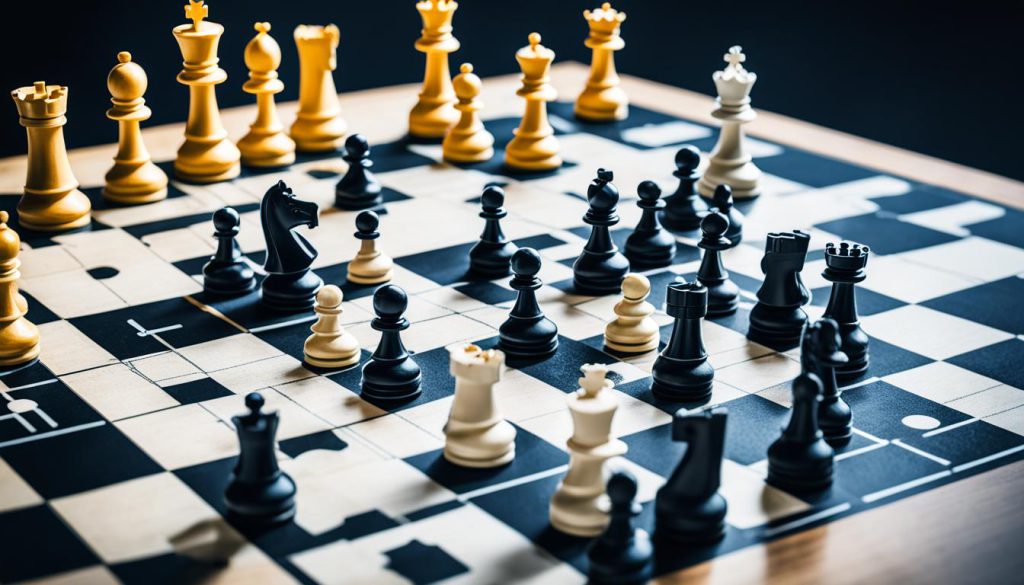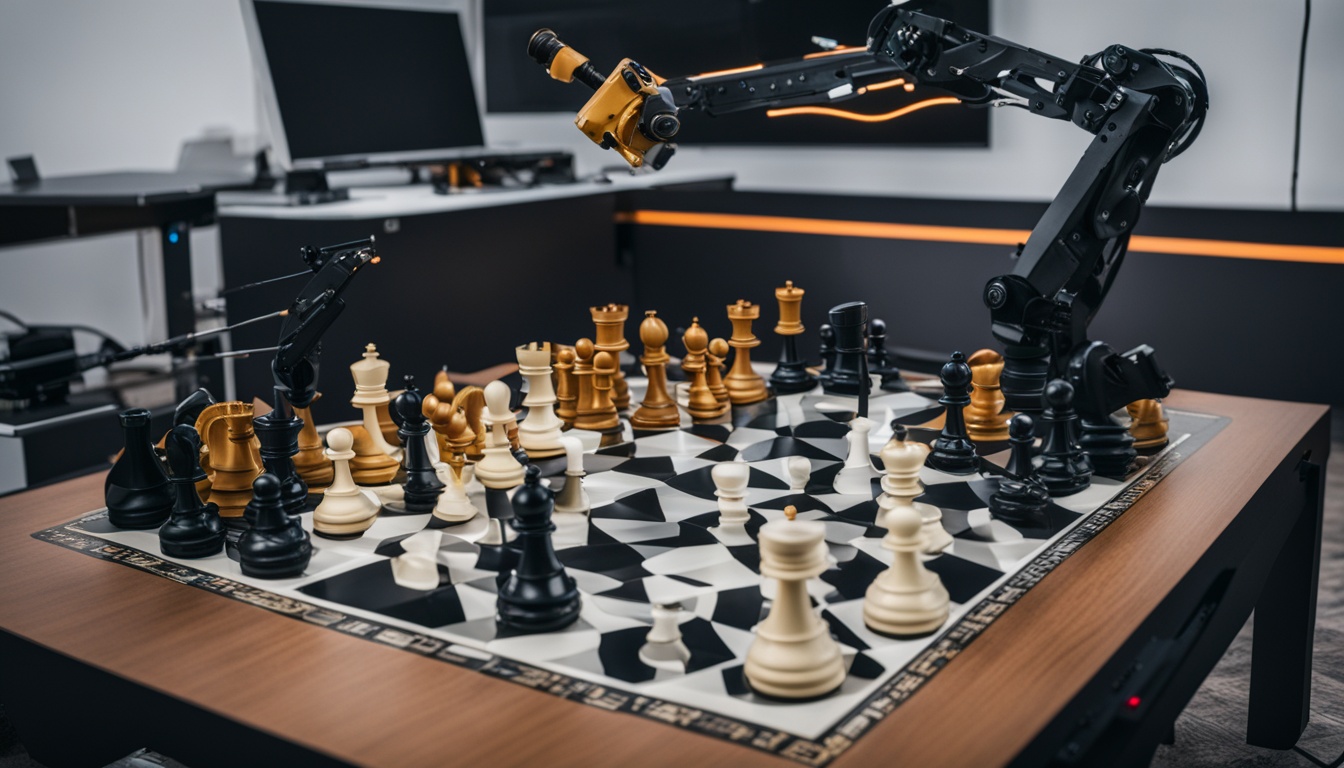Can machines transform a game as complex and storied as chess? This question got everyone talking when IBM’s Deep Blue beat Garry Kasparov in 1997. Since then, artificial intelligence has changed how we approach chess.
The game of chess was once evolving slowly. But AI and machine learning turned it into a global sensation. AlphaZero, an AI that teaches itself, won 28 times and tied 72 times with Stockfish. It didn’t just play better; it changed how we think about chess strategy.
Grandmasters like Hikaru Nakamura have made chess more popular, helped by AI. Shows like “The Queen’s Gambit” also made chess cool again. Because of AI, more people love chess now.
Key Takeaways
- The 1997 victory of IBM’s Deep Blue over Garry Kasparov ignited widespread interest in AI’s capabilities in chess.
- AlphaZero, a self-learning AI, has outperformed traditional chess engines like Stockfish, redefining chess strategies.
- Charismatic players and popular media have spurred the growth of chess, enhanced by AI advancements.
- Machine learning has transformed chess into a more globally accessible and popular game.
- AI’s role in chess continues to evolve, pushing both the boundaries of gameplay and fan engagement.
The Evolution of AI in Chess
The journey of AI in chess is fascinating. It started with key milestones that shaped today’s chess algorithms and advanced game strategies.
Deep Blue and Garry Kasparov
The battle between Garry Kasparov and IBM’s Deep Blue was critical. In 1996, Kasparov kept his title with a 4-2 win. But in 1997, Deep Blue made history by beating a grandmaster. This machine could think through 200 million moves per second.
It used 480 special circuits to plan 40 moves in advance. This showed how powerful chess algorithms were. It also proved AI could go beyond human thinking in chess.
AlphaZero’s Impact
AlphaZero, by DeepMind, was a big step forward for AI in chess. It learned on its own, using no past game plans. This allowed AlphaZero to win against Stockfish in a big way in 2017. It chose quality moves over simply having many options.
Then, Leela Chess Zero (LCZero) triumphed over Stockfish in 2019. It won the Top Chess Engine Championship season 15. Today’s chess AI are now even better than the top human players. They also change how grandmasters play today.
From Deep Blue to AlphaZero and chess, we’ve seen huge growth. There’s been amazing progress in learning machines and chess strategy.
AI Chess Engines and Modern Chess
In modern chess, AI chess engines have changed the game a lot. Over 2700 grandmasters use AI to prepare their strategies. These engines, like Stockfish, are top in chess computer rankings. They solve chess problems like no one else.
Look at AlphaZero. It reached the top of deep learning chess quickly. After just four hours of training itself, AlphaZero won 28 games against Stockfish. It also tied in 72 games and lost none. This shows how fast AI can improve and create new strategies.
Chess is very complex. It has over 10111 possible positions. There are also 318 billion ways to start a game. Engines like Mittens, with ratings up to 3500, win 99% of their games against humans. They look at many positions to play better and change chess strategies.
Now, we see new openings and smart plays in chess, thanks to AI. Deep Blue could look at a billion moves a second. This showed how AI could help in chess. This is still true with today’s engines.
In 2017, AlphaZero beat Stockfish with 28 wins and 72 ties. This showed that AI systems are leading in chess innovation. In 2019, Leela Chess Zero beat Stockfish too. This shows how much AI adds to chess.
Today, the best AI engines have FIDE ratings over 3400. This is much higher than human players. Even the world chess champion, with a rating over 2800, couldn’t win against Stockfish 9. This clearly shows that AI is changing chess a lot.
How Machine Learning is Revolutionizing Chess
Machine learning has changed how we play and understand chess. It’s amazing that AlphaZero learned the game in hours and beat Stockfish. Stockfish was known as one of the strongest chess engines. This happened through reinforcement learning.
AI learns from data without being directly programmed. This has led to new strategies in chess that mirror human thinking. The match between AlphaZero and Stockfish showed this power. AlphaZero won 28 games and tied 72 out of 100, with no losses.
Today, over 95% of top Grandmasters use AI for game analysis. They rely on AI for suggestions on moves. An AI called Mittens, with an Elo rating of 3200-3500, wins 99% of its games against humans.
We’re seeing a big change in chess because of machine learning. It combines new learning with classic game analysis. For those curious about AI in chess, this article on AI and chess engines is very interesting.
The growth of AI engines means a bright future for chess. With new strategies being developed, the game is more exciting than ever. This is just the start of a shift that will forever alter chess.
The Rise of Neural Networks in Chess Programming
Neural networks have changed the game in chess programming. They moved us from rule-based systems to learning from data. Now, neural networks help chess engines analyze positions, suggest moves, and predict outcomes with amazing accuracy.
Understanding Neural Networks
At the core of this AI chess revolution are neural networks. They can spot complex patterns and strategies from millions of games. This helps them find new ways to play chess, changing the game for AI.

AlphaZero is a great example of this technology. It learned chess on its own, getting better game by game. With deep learning, AlphaZero beat top engines by using bold pawn moves and smart sacrifices.
This shows how deep learning algorithms bring new tactics into AI chess. It makes AI engines smarter than ever before.
Application in Chess
Neural networks do more than improve strategy for chess programming. They power tools that give deep insights on endgame moves. They also help players, from novices to experts, see their weak spots and get better.
This blend of neural networks in chess offers endless practice and deep analysis. It’s changing how we learn chess, making high-level coaching available to everyone.
The growth of neural networks in chess programming has changed competitive chess. As AI gets smarter, the future of chess looks thrilling. It’s a mix of human creativity and AI, bringing new ideas to life.
Chess Machine Learning: Key Techniques and Algorithms
Learning about chess machine learning techniques helps us understand the progress of chess engines. These methods have changed how AI systems evaluate and play chess, often doing better than humans. It’s really exciting to see how AI changes chess tactics, adding depth and excitement to the game.
Reinforcement Learning in Chess
Reinforcement learning lets AI improve its play by using rewards. It’s key for engines like AlphaZero by DeepMind. AlphaZero learns from millions of games to find the best moves. In just four hours of learning, it won 28 games and tied 72 against Stockfish—a top engine.
Using deep learning and Monte Carlo Tree Search, it reached amazing results without losing once.
This innovation has raised the standards for chess AI. It shows how powerful reinforcement learning is in chess. These systems get better by analyzing their games, turning them into tough challengers.
Monte Carlo Tree Search
Monte Carlo Tree Search (MCTS) is crucial in chess AI. It helps engines explore moves and outcomes to find the best play. By combining MCTS with other AI technologies, chess engines like AlphaZero have become more strategic.
Today’s leading chess programs, like Stockfish and Leela Chess Zero, use advanced AI methods. For instance, Stockfish applies several techniques for in-depth analysis. Among these are Alpha-Beta Pruning and Multi-Threading. These methods show how MCTS helps in evaluating chess positions, leading to better decisions.
The influence of these techniques on chess is significant. They give engines exceptional ability to analyze and strategize. Thanks to reinforcement learning and Monte Carlo Tree Search, AI-powered engines are redefining the limits of chess.
The Role of Data Analysis in Chess Strategies
Data analysis is crucial in today’s chess strategies. Thanks to AI technology advances, engines can look deeply into huge amounts of chess data. This leads to discovering valuable insights and better strategies.

Chess Databases and Their Importance
Chess databases are essential for AI engines and players. They hold millions of past games for deep study and comparison. These databases help top players and engines like Stockfish stay ahead by analyzing past strategies.
With these databases, players can deeply study various positions. This ranges from openings to complex middle games. It helps in creating advanced strategies.
Simulation and Probability
Game simulation in chess data analysis is key. Engines like Deep Blue and AlphaZero can simulate millions of positions quickly. This helps them see many possible outcomes and predict chances of success accurately.
AlphaZero’s win over Stockfish showed its strong strategic understanding. Thanks to analyzing and simulating many positions. Engines like Leela Chess Zero (LC0) also show how useful simulation and learning are in making strategies better.
AI engines combine chess data analysis, simulation, and understanding probabilities well. This sets new standards in strategic thinking and changes how we play and understand chess today.
AI in High-Level Chess Competitions
AI has changed high-level chess greatly, making new strategies and tactics for top players. It has had a big impact on the game.
Case Studies of Recent Tournaments
In 1997, IBM’s Deep Blue beat world champion Garry Kasparov. This win got millions interested in chess. It showed how good AI can be at strategic games. Then, AlphaZero won 28 times and tied 72 times out of 100 games with Stockfish. These events show how AI has changed chess tournaments.
Grandmaster Magnus Carlsen, the world champion, uses AI to help with his game. He picks opening moves with AI’s help. You can see this in AI chess competitions. This way of using AI is common among top players now.
But, AI in chess also causes problems. For example, about 2% of the players were caught cheating in the European Online Chess Championship in 2020. They used computer engines to help them win. Chess.com now uses cheat detection to stop this. They’ve closed nearly 500,000 accounts for cheating.
This keeps chess fair and shows how much AI has improved the game. As AI gets better, it will bring new tactics and strategies to chess. It makes the game more exciting and innovative for everyone.
Combating Cheating with AI
The rise of AI in chess has made fighting cheating especially important. This is true, especially for online chess. AI cheat detection systems help keep the game fair. They do this by spotting patterns in gameplay that look like cheating.
Cheat Detection Methods
AI cheat detection methods are complex and detailed. They compare player moves to those of known engines. They also use models to guess if someone is cheating. For instance, Chess.com shut down nearly 500,000 accounts by 2020 with AI’s help. The AI model by Irwin and Kaladin gives players a “cheater score”. This score shows how likely it is that a player is cheating.
Challenges and Solutions
Yet, AI cheat detection faces big challenges. One main problem is the false-positive rate. Lichess once reported a 1-2% error rate in cheat detection. This situation shows it’s tough to keep online chess fair without wrongly accusing honest players.
To improve, platforms track behavior and update their models. Lichess uses machine learning to better spot cheaters. But, they must be careful. Errors can happen if the data used to train these systems is not right.
Here are some key data points on fighting chess cheating with AI:
| Statistic | Detail |
|---|---|
| false-positive rate on Lichess | 1-2% |
| Accounts closed by Chess.com as of 2020 | Nearly half a million |
| Percentage of players disqualified in the European Online Chess Championship | 2% |
With ongoing improvements in detection methods and solving challenges, AI is crucial for fair play. It keeps online chess honest in our digital world.
AlphaZero vs. Traditional Chess Engines
AlphaZero changed how chess engines work, making a big leap in AI chess. Developed by DeepMind, it uses self-play and learns from its own experiences. This is different from how traditional chess engines work.
Older engines like Stockfish 14 depend on brute-force search and known strategies. They use algorithms like minimax and alpha-beta pruning. Stockfish 14 also values piece positions, king safety, and pawn structure in its game analysis. But adding neural networks improved their abilities.
AlphaZero’s approach stands out. It uses neural networks to figure out winning chances from different game positions. This helps it make strategies on its own through deep learning. For example, AlphaZero beat Stockfish quickly after training for only a few hours in 2017. This was a big moment in AI chess.
AlphaZero analysis shows it learns and adapts all the time. It’s different from older methods. A clone named LeelaChessZero follows AlphaZero’s ways. By 2019, it became one of the top chess engines thanks to its learning abilities.
As AI in chess engines progresses, traditional ones like Stockfish get better too. They now use neural networks too, mixing brute force with smart play. This was inspired by techniques used in AlphaZero.
DeepMind’s work with AlphaZero has led to new kinds of engines. They go beyond usual, predictable plays to new, self-thought strategies. This marks a fast growth in AI chess, changing how players prepare and strategize globally.
Accessibility and Popularity of Chess with AI
AI has made chess more accessible and popular. Platforms like Chess.com offer smart AI analysis and tutorials. This helps players get better at the game fast. The growth of chess has greatly benefited from this increased access. The impact of AI on chess can be seen by more people playing on these platforms.
Nearly 4000 people competed in the European Online Chess Championship in May 2020. This shows how online platforms are becoming more popular with AI’s help. Even though 2% of players were disqualified for cheating, most games were fair thanks to good monitoring systems.
AlphaZero, an AI engine, had 28 wins and 72 draws against Stockfish. It has changed how chess is played, making it tougher and more fun. Top players like Magnus Carlsen use AI to help plan their first moves. This shows how deeply AI affects top-level chess.
Chess.com has closed nearly half a million accounts for cheating by 2020. They use detailed models to catch cheaters. This makes the platform more trustworthy and chess more popular by ensuring fair competition.
| Event | Participants | AI’s Role | Outcome |
|---|---|---|---|
| European Online Chess Championship 2020 | 4000 | Enhanced monitoring and fairness | 2% disqualified |
| AlphaZero vs. Stockfish | 100 games | Innovative strategies | 28 wins, 72 draws (AlphaZero) |
| AI in Magnus Carlsen’s Preparation | N/A | Engine-assisted moves | Strategic advantages |
| Chess.com Anti-Cheating Measures | 500,000 accounts | Statistical models | Improved platform integrity |
Deep Blue’s win over Garry Kasparov in 1997 was a game-changer. It made chess and AI fascinating to many. AI today is reshaping how we play and view chess, appealing to pros and fans alike. As AI improves, the love for chess worldwide grows, making it a game everyone can enjoy.
Conclusion
Reflecting on chess and artificial intelligence, it’s clear how AI has transformed chess. The victory of Deep Blue over Garry Kasparov in 1997 marked a significant moment. It not only pushed AI forward in chess but also made the game more popular and complex. Now, AI engines like AlphaZero are changing the game even more. They show incredible skill by winning many games against top software, showcasing their strategic edge.
Today, AI’s effect touches everyone—from top players like Magnus Carlsen to casual fans. Carlsen uses AI for new strategies, and amateurs enjoy improved learning tools online. The game has become more accessible, thanks to AI. This has drawn in millions of new players, helped by the pandemic and “The Queen’s Gambit” fame. However, there’s a downside: cheating has increased. Chess.com had to close nearly half a million accounts for cheating by 2020. This shows the challenges of keeping online chess fair.
Despite these issues, the outlook for chess AI is bright. Machine learning will likely make chess even more strategic and popular. As AI grows, finding the right balance between its benefits and challenges is key. One thing’s for sure: the mix of human brains and AI will keep making chess an exciting game. It offers great opportunities for both players and fans around the world.
Source Links
- https://medium.com/illumination-curated/ai-and-its-impact-on-chess-78e4ceb95c21
- https://www.ncbi.nlm.nih.gov/pmc/articles/PMC7759436/
- https://builtin.com/artificial-intelligence/chess-ai
- https://www.iec.ch/blog/evolution-ai-through-chess
- https://www.codemotion.com/magazine/ai-ml/the-ultimate-checkmate-ai-and-chess-engines/
- https://blog.purestorage.com/perspectives/how-ai-powers-chess-engines-and-creates-grandmasters/
- https://www.linkedin.com/pulse/rise-neural-networks-chess-revolutionizing-analysis-gameplay-chelbi-cithf
- https://www.chess.com/blog/motorsuresh/checkmate-by-algorithm-the-rise-of-ai-in-the-world-of-chess
- https://talkchess.com/viewtopic.php?t=83435&start=20
- https://ioaglobal.org/blog/integration-of-chess-and-data-science-techniques/
- https://lichess.org/forum/general-chess-discussion/analysis-of-lichess-cheating-detection-with-machine-learning-ml-a-mis-use-of-ml–doesnt-work
- https://eng.ox.ac.uk/case-studies/chess-how-to-spot-a-potential-cheat/
- https://towardsdatascience.com/alphazero-chess-how-it-works-what-sets-it-apart-and-what-it-can-tell-us-4ab3d2d08867
- https://www.reddit.com/r/chess/comments/skeqj5/do_you_think_neural_networks_or_traditional_chess/
- https://www.chess.com/article/view/computers-in-chess-the-conclusion

